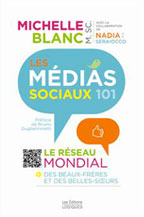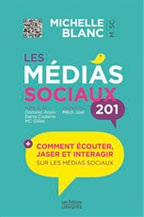Le blogue fait avancer la pensée économique selon The Economist et le journalisme selon Nick Kristof du NYT
Tandis que pour une Nième fois, un média se demande si le blogue est mort (ça se passait hier sur la radio de Radio-Canada), des institutions que je considère un peu plus sérieuse, The Economist et Nick Kristof du New York Times (dans Forbes) considèrent eux est qu’il est bien en vie et contribue positivement à l’avancement de la pensée.
Dans l’article Heterodox economics, Marginal revolutionaries : The crisis and the blogosphere have opened mainstream economics up to new attack on peut lire :
(…)Economics, perhaps more than any other discipline, has taken to blogs with gusto. Mainstream figures such as Paul Krugman and Greg Mankiw have commanded large online audiences for years, audiences which include many of their peers. But the crisis has made the academic establishment fractious and vulnerable. Highly credentialed economists now publicly mock each other’s ignorance and foolishness. That has created an opening for the less decorated members of the guild, and the truly peripheral. In the blogosphere anywhere can be, as the title of Mr Mosler’s blog has it, “The Center of the Universe”.
(…)Mr Sumner’s blog not only revealed his market monetarism to the world at large (“I cannot go anywhere in the world of economics…without hearing his name,” says Mr Cowen). It also drew together like-minded economists, many of them at small schools some distance from the centre of the economic universe, who did not realise there were other people thinking the same way they did. They had no institutional home, no critical mass. The blogs provided one. Lars Christensen, an economist at a Danish bank who came up with the name “market monetarism”, says it is the first economic school of thought to be born in the blogosphere, with post, counter-post and comment threads replacing the intramural exchanges of more established venues.
Dans l’autre article Economics blogs, A less dismal debate : Blogs are blamed for cheapening debate in some fields. Yet they have enriched economics on peut lire :
Previous publishing revolutions, such as the advent of printing, prompted similar concerns about trivialisation and extremism. But whatever you think about the impact of blogging on political, scientific or religious debate, it is hard to argue that the internet has cheapened the global conversation about economics. On the contrary, it has improved it…
The back-and-forth between bloggers resembles the informal chats, in university hallways and coffee rooms, that have always stimulated economic research, argues Paul Krugman, a Nobel-prizewinning economist who blogs at the New York Times. But moving the conversation online means that far more people can take part. Admittedly, for every lost prophet there is a crank who is simply lost. Yet despite the low barriers to entry, blogs do impose some intellectual standards. Errors of fact or logic are spotted, ridiculed and corrected. Areas of disagreement are highlighted and sometimes even narrowed. Some of the best contributors do not even have blogs of their own, serving instead as referees, leaving thoughtful comments on other people’s sites and often criss-crossing party lines.
This debate is not always polite. But was it ever? The arguments between John Maynard Keynes and Friedrich Hayek in the 1930s, some of them published in academic journals, were not notable for their tact. One observer likened their exchanges to the brawling of “Kilkenny cats”. Both men, one suspects, would have relished taking their battle online.
Et finalement dans Blogs Marginal revolutionaries l’auteur conclut par :
The economics blogosphere, timely as ever, has provided a nice illustrative example in recent weeks, in the form of an ongoing debate on the nature of sovereign debt burdens and the implications of Ricardian equivalence for fiscal policy. Nick Rowe helpfully collects many of the relevant links here. The discussion is not always polite. It is interesting and enlightening, however. And it disciplines participating thinkers in a way that few other mediums manage.
Il n’y a donc pas de place à l’imagination, les blogues sur l’économie ne sont pas toujours polis et quelquefois impertinents, mais ils permettent de discipliner la pensée des participants comme aucun autre médium ne sait le faire. Qui plus est, la blogosphère a amélioré la science économique.
But whatever you think about the impact of blogging on political, scientific or religious debate, it is hard to argue that the internet has cheapened the global conversation about economics. On the contrary, it has improved it…
Sur le front des médias traditionnels, on peut lire dans Fastcompany The New York Times’s Nick Kristof On Journalism In A Digital World And The Age Of Activism
Nicholas Kristof has been writing for The New York Times for more than a quarter century and has appeared on that paper’s op-ed page since 2001, often penning articles about the struggles of people in distant parts of the world. He has even been dubbed the “moral conscience” of his generation of journalists. Less well known is his role as an innovator in journalism. In 2003, he became the first blogger for The New York Times website. Ever since then, Kristof has been a pioneer among journalists in the digital world. He’s active on Twitter and Facebook. In 2012, he even plans to venture into online gaming.
(…)Is this a revolutionary shift in journalism or a more natural progression?
In some ways, it’s just an adaptation of traditional journalistic approaches. I used to call a bunch of experts about who I should interview in Haiti. I still do that, but now I also send inquires through social media. That change feels incremental. We’re moving from a format where we “proclaimed the news” to the world on a fixed schedule to one where we converse with the world on a 24/7 basis. That does feel like a significant change. I don’t think what we do 20 years from now will look much like what we’re doing today. I don’t think op-ed columnists will be limited to two 780-word columns a week.(…)Is there a more problematic side with the journalism in the digital age? Do you worry that citizen journalism diminishes overall credibility, for instance?
I think that there will always be a hierarchy of credibility. We in the media have historically been gatekeepers. Now I think that’s largely lost, and that’s a disadvantage. But having people shooting videos everywhere provides a useful level of accountability. A lot of people including me were really taken aback by the videos of police violence during Occupy Wall Street. A decade ago nobody would have known about that because there wouldn’t have been a reporter there and even if someone did write about it, it wouldn’t have been that dramatic. Likewise in Syria, widespread video does provide some constraint on a government if it knows that if it massacres people, there will be video of that. They may still decide to massacre people, but it raises the price.
Entretemps, ici on se demande si le blogue est mort et plusieurs journalistes « badtripent » sur l’arrivée du Huffington Post Québec. D’ailleurs ça me fait rire de voir des personnalités influentes se ruer chez le Huffington Post ou pire encore, chez Voir (pour faire des billets payants c’est à dire à 5 $ du 1000 pages vues, la belle affaire) tandis que d’autres (notamment plusieurs copains blogueurs d’affaires), plus intelligents ou stratégiques sans doute, se font payer convenablement pour écrire sur d’autres plates-formes médiatiques. D’ailleurs, quelques journalistes pigistes m’ont confié avoir été capables de négocier des tarifs à la hausse avec leur média actuel pour qu’ils n’aillent pas chez le Huffington Post gratuitement. Des fois le gratuit c’est payant pour d’autres, des fois l’animal mort renaît de ses soi-disant cendres et des fois, la peur du changement est pire que la saine tentative d’enfourcher la bête …
MAJ
La dernière discussion médiatique de la mort des blogues au Québec remonte (dans mon blogue et de mémoire) en août 2008. J’en parlais dans mon billet Le phénomène blogue tirerait à sa fin?
MAJ
C’est via un status Facebook de Christian Aubry que j’ai pris connaissance de l’article l’Agence Science Presse L’avenir est biaisé en faveur des blogues qui va en plein dans le sens de mon billet. On peut y lire :
(…) il est devenu difficile de nier le poids qu’a acquis un blogueur comme P.Z. Myers dans les débats sur le créationnisme, la crédibilité d’un Seth Mnookin dans celui sur la vaccination, l’influence d’un Revkin dans celui sur le climat, d’un Mooney dans celui sur la politisation de la science…
(…)Certains qui lisent ces lignes regrettent déjà de ne pas y être allé, d’autres sont peut-être sceptiques, et je leur donne raison. Si je recommande sans hésiter le congrès annuel de l’Association américaine pour l’avancement des sciences (AAAS) à n’importe quel journaliste scientifique, avecScience Online, je suis mitigé. Les professionnels de la communication qui n’ont ni blogue ni twitter ni baladodiffusion, s’y sentiront en terre étrangère. Les scientifiques pour qui vulgariser se limite à une conférence de temps en temps ne sauront trop quoi y ramasser. Il faut croire en la vulgarisation, mais plus encore, il faut avoir envie d’expérimenter, ne serait-ce qu’en rédigeant un blogue. Et si on travaille du côté des médias, il faut avoir la conviction que le journalisme scientifique ne sera pas demain ce qu’il est aujourd’hui… et que ce n’est pas une mauvaise chose.
Article publié le mercredi, 11 janvier 2012 sous les rubriques Blogue, Blogues d'affaires, Economie des affaires électroniques, Médias sociaux, Medias et Internet et politique et internet.












